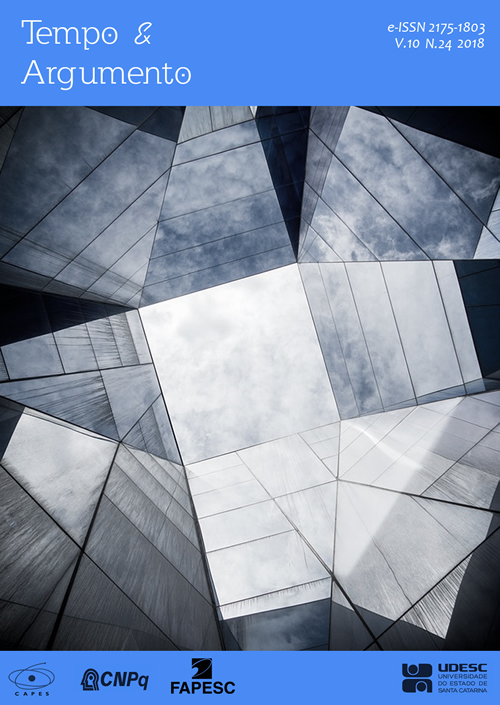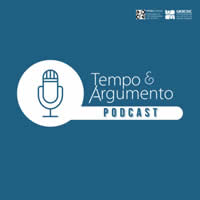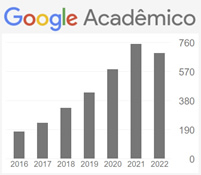Virada digital? Pesquisa histórica no ciberespaço
DOI:
https://doi.org/10.5965/2175180310242018136Resumo
A popularização da informática e da rede mundial de computadores entre as novas gerações de alunos tomou o mundo acadêmico de surpresa. Os historiadores não ficaram alheios a essas mudanças e, aos poucos, aprenderam a usar as novas tecnologias em seu benefício. Pretendo mostrar aqui que o advento da world wide web permitiu que os pesquisadores da área de História modificassem significativamente sua forma de pesquisar. Não faz parte de meus objetivos neste trabalho abordar as produções históricas na rede ou as chamadas ‘humanidades digitais’; concentrar-me-ei agora apenas na fase de pesquisa da operação historiográfica.
Palavras-chave: Historiografia. Pesquisa Histórica. Pesquisa Bibliográfica. Busca Bibliográfica em Linha. Ferramentas de Busca na Web.
Downloads
Referências
ABOUT Million Short. Million Short: what haven’t you found? Toronto, Canadá, 2017. Disponível em: <https://millionshort.com/about> Acesso em 7 out. 2017.
ANKERSMIT, Frank. History and tropology: the rise and fall of metaphor. Berkeley, CA: University of California Press, 1994, p. 44-75.
APPLE pode se tornar a primeira empresa de US$ 1 trilhão em 2018. Época Negócios Online. São Paulo, 3 jan. 2018. Disponível em: <https://epocanegocios.globo.com/Empresa/noticia/2018/01/apple-pode-se-tornar-primeira-empresa-de-us-1-trilhao-em-2018.html>. Acesso em 17 fev. 2018.
ARAÚJO, George Zeidan. Ler, pesquisar e escrever história em tempos de internet: desafios e possibilidades. Revista Tempo e Argumento, Florianópolis, v. 6, n. 12, p. 151-164, maio/ago. 2014.
ARCHIE search engine from McGill University. History of domain names. Bellevue, WA, 2012. Disponível em: <http://www.historyofdomainnames.com/archie/>. Acesso em 29 set. 2017.
AYERS, Edward L. The pasts and futures of digital history. VIRGINIA Center for Digital History. Charlottesville, VA, 1999. Disponível em: <http://www.vcdh.virginia.edu/PastsFutures.html>. Acesso em 28 mar. 2012.
BAKER, James. A history of history through the lens of our digital present, the traditions that shape and constrain data-driven historical research, and what librarians can do about it. In: WHITE, John W.; GILBERT, Heather. (Eds.). Laying the foundation: digital humanities in academic libraries. West Lafayette, IN: Purdue University Press, 2016, p. 15-31.
BARTHES, Roland. Le discours de l’histoire. Social Science Information, Paris, v. 6, n. 4, p. 63-75, 1967. Doi:10.1177/053901846700600404
BARTHES, Roland. L’effet de reel. Communications, Paris, v. 11, p. 84-89, 1968. Doi:10.3406/comm.1968.1158
BERNERS-LEE, Tim; HENDLER, James; LASSILA, Ora. The semantic web. A new form of web content that is meaningful to computers will unleash a revolution of new possibilities. Scientific American. Nova Iorque, 1º maio 2001. Disponível em: <http://www.scientificamerican.com/article/the-semantic-web/>. Acesso em 25 mar. 2016.
BOLTER, Jay David; GRUSIN, Richard. Remediation: understanding new media. Cambridge, MA: The MIT Press, 2000.
BRESCIANO, Juan Andrés. El historiador, los archivos y los medios informáticos. Ricerche Storiche Salesiane: Rivista semestrale di storia religiosa e civile, Roma, ano XXI, n. 1, p. 157-178, 2002.
BROADLEY, Claire. Altavista: the rise and fall of the early search engine. Digital.com. Londres, 2017. Disponível em: <https://digital.com/about/altavista/>. Acesso em 29 set. 2017.
BULGER, Monica et al. Reinventing research? information practices in the humanities. Londres: Research Information Network, 2011.
CHASSANOFF, Alexandra. Historians and the use of primary source materials in the digital age. The American Archivist, Nova Iorque, v. 76, n.2, p. 458-480, 2013.
COMO funcionam os algoritmos da Pesquisa. Google search. Mountain View, CA, 2017. Disponível em: <https://www.google.com/search/howsearchworks/algorithms/>. Acesso em 4 out. 2017.
CRISCIONE, Antonino. Sopravviverà la storia all’ipertesto? Memoria e Ricerca, Ravena, Itália, n. 12, 2003.
DANIEL, Dominique. Teaching students how to research the past: historians and librarians in the digital age. The History Teacher, Long Beach, CA, v. 45, n. 2, p. 261-282, fev., 2012.
DANTO, Arthur C. Narrative sentences. History and Theory, Middletown, CT, v. 2, n. 2, p. 146-179, 1962.
de CERTEAU, Michel. L’écriture de l’histoire. Paris: Gallimard, 1975.
DiNUCCI, Darcy. Fragmented future. Print. Palm Coast, FL, p. 31, 221-222, abr. 1999. Disponível em: <http://darcyd.com/fragmented_future.pdf>. Acesso em 25 mar. 2016.
DURANTI, Luciana. The impact of digital technology on archival science. Archival Science, Heidelberg, Alemanha, v. 1, n. 1, p. 39-55, 2001.
ERNST, Wolfgang. Dis/continuities: does the archive becomes metaphorical in multi-media space? In: CHUN, W. H. K.; KEENAN, T. (Eds.). New media, old media: a history and theory reader. Nova Iorque: Routledge, 2006, p. 105-123.
FARIA, Daniel. Anamorfose de um dia: o tempo da história e o dia 11 de dezembro de 1972. História da Historiografia, Ouro Preto, n. 17, p. 11-29, abr. 2015.
FOGU, Claudio. Digitalizing historical consciousness. History and theory, Middletown, CT, v. 48, n. 2, p. 103-121, maio, 2009.
GALLIA, Arturo. Lo storico nella rete. In: MERLUZZI, Manfredi. (Ed.). Ad limina. Percorsi storiografici di frontiera. Roma: Aracne, 2008, p. 289-326.
GALLINI, Stefania; NOIRET, Serge. La historia digital en la era del web 2.0: introducción al dossier historia digital. Historia Crítica, Bogotá, n. 43, p. 16-37, 2011.
GELERNTER, David. Machine beauty: elegance and the heart of technology. Nova Iorque: Basic Books, 1998.
GLOBAL market share of search engines 2010-2017. Statista. The Statistics Portal. Hamburgo, Alemanha, 2017. Disponível em: <https://www.statista.com/statistics/216573/worldwide-market-share-of-search-engines/>. Acesso em 28 set. 2017.
GUHA, Ramanathan V. Light at the end of the tunnel. In: INTERNATIONAL SEMANTIC WEB CONFERENCE, 12., 2013; AUSTRALASIAN SEMANTIC WEB CONFERENCE, 1., 2013. Keynote… Sydney: University of Technology, 2013. Disponível em: <http://iswc2013.semanticweb.org/content/keynote-ramanathan-v-guha.html>. Acesso em 25 mar. 2016.
HARLAN, David. Editorial: in this issue. Rethinking history, Londres, v. 8, n. 2, p. 185-192, 2004.
HAYLES, N. Katherine. How we became posthuman. Virtual bodies in cybernetics, literature, and informatics. Chicago, IL: The University of Chicago Press, 1999.
HEIMBURGER, Franziska; RUIZ, Émilien. Faire de l’histoire à l’ère numérique: retours d’expériences. Revue d’histoire moderne et contemporaine, Paris, v. 58, n. 4-bis, p. 70-89, 2011.
HUSSEY, Matthew. There are just 7,000 web users in North Korea. TNW. Amsterdã, 28 jan., 2016. Disponível em: <https://thenextweb.com/asia/2016/01/28/there-are-just-7000-web-users-in-north-korea/#.tnw_50YNZ00u>. Acesso em 4 out. 2017.
KEMMAN, Max; KLEPPE, Martijn; SCAGLIOLA, Stef. Just Google it. Digital research practices of humanities scholars. In: DIGITAL HUMANITIES CONGRESS, 1., 2012, Sheffield, Reino Unido. Proceedings… Sheffield: HRI Online Publications, 2014. Disponível em: <https://www.hrionline.ac.uk/openbook/chapter/dhc2012-kemman>. Acesso em 14 out. 2017.
KIRSCHENBAUM, Matthew G. What is digital humanities and what’s it doing in English departments? ADE Bulletin, Nova Iorque, n. 150, p. 55-61, 2010.
LANDRY, Tommy. Search engine market share by country. Return On Now. Austin, TX, 13 jun. 2012. Disponível em: <http://returnonnow.com/2012/06/search-engine-market-share-country/>. Acesso em 28 set. 2017.
LÉVY, Pierre. Cibercultura. Tradução de Carlos Irineu da Costa. São Paulo: 34, 1999. Publicado originalmente em 1997.
LUCCHESI, Anita. Histórias no Ciberespaço: viagens sem mapas, sem referências e sem paradeiros no território incógnito da Web. Cadernos do Tempo Presente, São Cristóvão, SE, v. 6, 2012. Disponível em: <http://www.seer.ufs.br/index.php/tempo/article/view/2624>. Acesso em 17 set. 2015.
LUCCHESI, Anita. Por um debate sobre História e Historiografia Digital. Boletim Historiar, São Cristóvão, SE, n. 2, 2014. Disponível em: <http://www.seer.ufs.br/index.php/historiar/article/view/2127>. Acesso em 22 mar. 2016.
McCLYMER, John F. From scarcity to abundance: a frame for the profession's conversation about teaching and learning with online resources. The AHA guide to teaching and learning with new media. Washington, DC: American Historical Association, 2014. Disponível em: <http://www.historians.org/teaching-and-learning/classroom-content/the-aha-guide-to-teaching-and-learning-with-new-media>. Acesso em 16 set. 2015.
McLUHAN, Marshall. The Gutenberg galaxy: the making of typographic man. Toronto, Canadá: University of Toronto Press, 1962.
McLUHAN, Marshall. Understanding media: the extensions of man. Nova Iorque: McGraw-Hill, 1964.
MOUNIER, Pierre. L’édition électronique: un nouvel eldorado pour les sciences humaines? In: DACOS, Marin. (Dir.). Read/write book: le livre inscriptible. Marselha: OpenEdition Press, 2010. Disponível em: <http://books.openedition.org/oep/169>. Acesso em 23 nov. 2014.
ORDUNA-MALEA, Enrique et al. Methods for estimating the size of Google Scholar. Scientometrics, Budapeste, Hungria, v. 104, n. 3, p. 931-949, set. 2015. Doi:10.1007/s11192-015-1614-6
POE, Marshall. Fighting bad history with good, or, Why historians must get on the web now. Historically Speaking, Baltimore, MD, v. 10, n. 2, p. 22, abr. 2009.
POSTER, Mark. History in the digital domain. Historein, Atenas, v. 4, n. 4, p. 17-32, 2003.
POSTER, Mark. Manifesto for a history of the media. In: JENKIS, Keith; MORGAN, Sue; MUNSLOW, Alun. (Eds.). Manifestos for history. Londres: Routledge, 2007. p. 39-49.
RICŒUR, Paul. A memória, a história, o esquecimento. Tradução de Alain François et al. Campinas: Unicamp, 2007. Publicado originalmente em 2000.
RIGNEY, Ann. When the monograph is no longer the medium: historical narrative in the online age. History and theory, Middletown, CT, v. 49, n. 4, p. 100-117, dez. 2010.
RORTY, Richard M. (Ed.). The linguistic turn: essays in philosophical method. Chicago: The University of Chicago Press, 1992, p. 1-39. Publicado originalmente em 1967.
ROSENZWEIG, Roy. ‘So, what’s next for Clio?’ CD-ROM and historians. Essays on history and new media. Fairfax, VA: Roy Rosenzweig Center for History and New Media, mar. 1995. Disponível em: <http://chnm.gmu.edu/essays-on-history-new-media/essays/?essayid=24>. Acesso em 22 ago. 2012.
ROSENZWEIG, Roy; COHEN, Daniel J. Web of lies? Historical knowledge in the Internet. In: ROSENZWEIG, Roy. Clio wired: the future of the past in the digital age. Nova Iorque: Columbia University Press, 2011. Ed. Kindle
RYAN, Johnny. A history of internet and the digital future. Londres: Reaktion, 2010.
RYGIEL, Philippe. L’enquête historique à l’ère numérique. Revue d’histoire moderne et contemporaine, Paris, v. 58, n. 4-bis, p. 30-40, 2011.
SCHNAARS, Steven P.; CARVALHO, Sergio W. Predicting the market evolution of computers: was the revolution really unforeseen? Technology in Society: An International Journal, Amsterdã, v. 26, n. 1, p. 1-16, 2004.
THE SIZE of the World Wide Web (The Internet). WorldWideWebSize.com. Nijmegen, Holanda. 2018. Disponível em: <http://www.worldwidewebsize.com/>. Acesso em 17 fev. 2018.
TAVARES, Célia Cristina da Silva. História e informática. In: CARDOSO, Ciro Flamarion; VAINFAS, Ronaldo (Orgs.). Novos domínios da história. Rio de Janeiro: Elsevier, 2012, p. 301-317.
TORAL, André Amaral de. A participação dos negros escravos na guerra do Paraguai. Estudos Avançados, São Paulo, v. 9, n. 24, p. 287-296, 1995. Disponível em: <http://www.scielo.br/pdf/ea/v9n24/v9n24a15.pdf>. Acesso em 25 maio 2014.
TOTAL number of Websites. Real Time Statistics Project. Dover, DE. 2018. Disponível em: <http://www.internetlivestats.com/total-number-of-websites/>. Acesso em 17 fev. 2018.
VEYNE, Paul. Comment on écrit l’histoire: essai d’épistémologie. Paris: du Seuil, 1971.
WALL, Aaron. Search Engine History. São Francisco, CA. 2006. Disponível em: <http://www.searchenginehistory.com/>. Acesso em 29 set. 2017.
WHITE, Hayden. Metahistory: the historical imagination in 19th-century Europe. Baltimore, MD: Johns Hopkins University Press, 1975.
WISCHENBART, Rüdiger. Global eBook: a report on market trends and developments. Viena: Rüdiger Wischenbart Content and Consulting, 2014.
WISCHENBART, Rüdiger. Global eBook: a report on market trends and developments. Viena: Rüdiger Wischenbart Content and Consulting, 2016.
WISCHENBART, Rüdiger. The global eBook market: current conditions & future projections. Viena: Rüdiger Wischenbart Content and Consulting, 2011.





